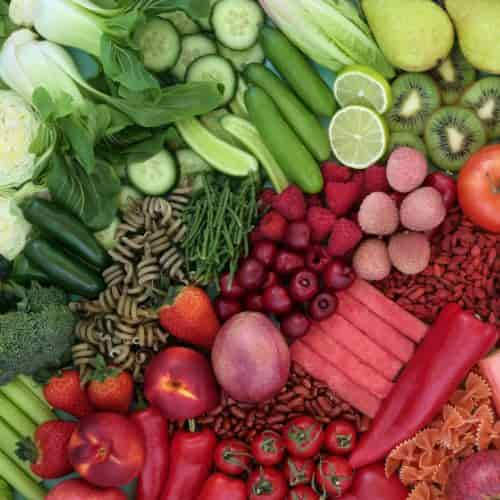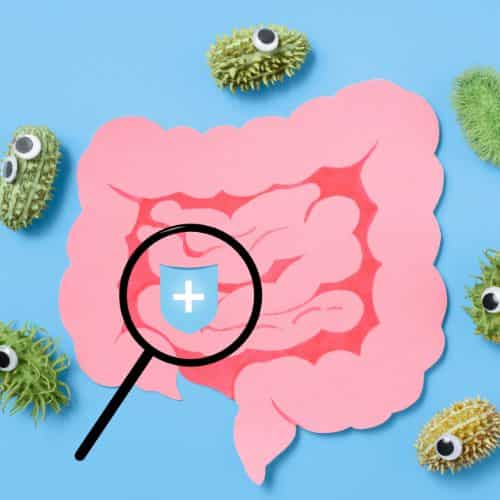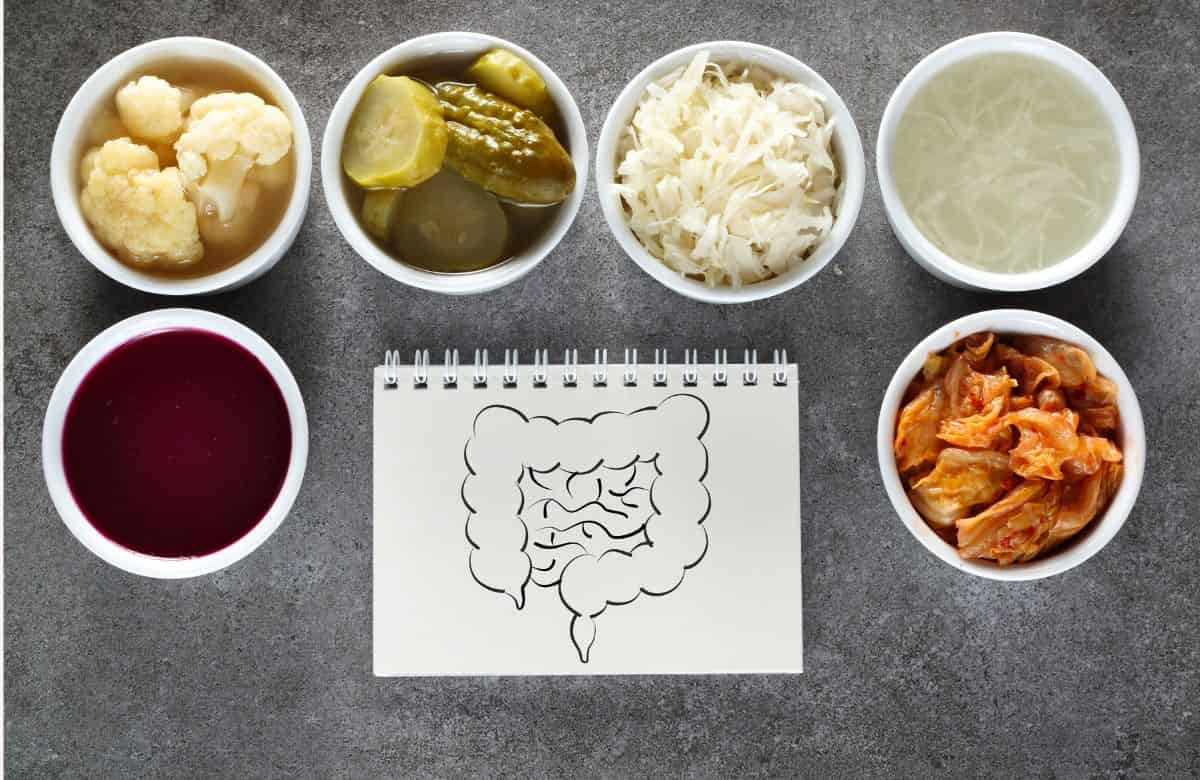How to Heal Your Gut Naturally [Easy Steps]
Gut health is essential for overall good health, so it’s important to take steps to ensure that your gut is well-supported.
Table of Contents
ToggleA healthy gut is necessary for good digestion, absorption of nutrients, immunity, hormonal balance, brain health, good mood, and even weight maintenance.
Fortunately, there are a few simple steps you can take to keep your gut operating as it should.
In this post, we will discuss straightforward, dietitian-approved remedies to heal your gut naturally.
Eat Fermented Foods

Incorporating fermented foods into your diet is a great way to boost gut health.
Fermented foods are rich in probiotics, which are vital in maintaining the important flora that are important for digestion. Probiotics diversify the microbiome with good bacteria that support the digestive system.
Fermented foods include kombucha, kefir, sauerkraut, kimchi, miso, tempeh, and yogurt.
Eat More Fiber
Dietary fiber is a crucial nutrient in our diets. Fiber maintains gut health and protects against systemic disease, impacting our overall health and well-being.
Fiber is deeply intertwined with our gut microbes. A high-fiber diet nourishes the healthy bacteria in the intestines, which increases the diversity of the microbiome.
Increasing the microbial diversity of our digestive tract increases the integrity of the mucosal lining in the gut. When the lining of the intestines is healthy, it promotes lower inflammation in the body, while good bacteria also aid digestion.
According to the Academy of Nutrition and Dietetics, 25 grams of fiber for women and 38 grams of fiber for men is recommended per day.
Probiotics and Prebiotics

Probiotics are good bacteria that live in the gut and help us stay healthy. Prebiotics are a form of fiber that feeds the good bacteria in our body.
While understanding the difference between prebiotics and probiotics can be tricky, it’s important to note that they both play vital roles in gut health.
Foods that naturally contain probiotics include kefir, sauerkraut, yogurts, kimchi, and kombucha.
Prebiotics are found in fiber. Food sources that contain prebiotics are fruits and vegetables such as citrus, kiwi, pear, and leafy greens.
Get my free probiotics and prebiotics food list here.
Take Probiotic and Prebiotic Supplements
If you’re not sure whether you’re getting enough through your diet, supplements are a great way to get the probiotics and prebiotics necessary for gut health.
Probiotic supplements can help restore balance in your microbiome. Prebiotic supplements are beneficial for maintaining intestinal health and restoring the microbial diversity in the body.
When choosing a probiotic supplement, find one with at least 1 billion colony-forming units (CFUs).
Keep in mind, though, that supplements are not a substitute for eating food that is high in prebiotics and probiotics.
Limit or Avoid Added Sugar and Processed Foods
Processed foods and added sugars go hand in hand. These serial health offenders have become increasingly difficult to avoid in the standard American diet.
Excessive intake of processed foods and added sugars decreases the good bacteria and microbiota diversity in the intestines.
Decreased diversity and unfavorable bacteria can effectively promote inflammation in the body. Inflammation has the potential to cause the development of many detrimental diseases, including cancer and heart disease.
The Academy of Nutrition and Dietetics recommends that added sugars be limited to no more than 10% of the calories consumed by an individual per day.
Drink More Water

Drinking enough water can increase microbiota diversity. Further, hydrated individuals have less harmful bacteria that can cause gastrointestinal infections.
Hydration is also a prominent factor in the prevention of constipation and keeps things moving smoothly in the gut.
The National Academy of Medicine recommends 13 cups for men and 9 cups for women of fluids per day. But you might need more if you exercise, or live in a place with hot wheater.
Stress Less
High-stress levels negatively impact gut health. There is an inherent gut-brain connection that means gastrointestinal distress can be the cause or product of anxiety.
Stress is enormously impactful on the efficiency of the GI tract and is also known contribute to disease and weight gain.
These days, chronic stress is unfortunately all too prevalent in many individuals’ lives. But there are many natural ways to lower pressure and anxiety. Exercise, meditation, aromatherapy, and quality time with loved ones are simple ways to reduce stress levels.
Move More

Moderate exercise promotes positive changes in the gut microbiome. Physical activity has been linked to the introduction of beneficial microbes and the enrichment of microbiome flora.
Exercise also reduces inflammation and intestinal permeability and increases body composition. What’s more, it has been shown improve mental health, including stress and anxiety.
According to CDC guidelines, adults should aim for 150 minutes of moderate-intensity exercise per week and two days of strength training.
Sleep Enough
Lack of high-quality sleep can change the gut microbiome for the worse. Studies show that high-quality sleep is linked to greater microbiome diversity.
Also, poor further affects gut health by increasing stress levels and promoting excess weight gain.
Prioritizing your rest and aiming for seven to eight hours of high-quality rest per night is recommended.
FAQ
What is the microbiome?

The gut microbiome is a complex system of microorganisms, such as bacteria, fungi, and viruses. They exist in a delicate balance, assisting the body in many functions.
Interestingly, each individual has a unique microbiota that is influenced by both genetic and lifestyle factors.
Why is gut health important?
A healthy gut is an important foundation for general good health. Intestinal problems are linked to a vast number of health conditions, including digestive issues, weight gain, and even diseases like diabetes.
Additionally, the gut microbiome impacts mental health and mood. For these reasons, it’s important to maintain a healthy balance of microorganisms in order to prevent disease and promote overall well-being.
The wellness of the digestive system also plays an essential role in the functioning of the immune system. So living with poor gut health in the long term can even result in the development of chronic diseases, such as autoimmune disorders.
What are the symptoms of an unhealthy gut?
There are many signs that may be present if your gut health is less than optimal.
- Digestive issues are a key sign of poor gut health. This can include recurring constipation, bloating, diarrhea, or gas.
- Unintentional weight fluctuations are another indicator of problems in this area. Weight gain due to inflammation or insulin resistance is a common result.
- Poor sleep and chronic fatigue are also signs of an unhealthy gut. Imbalances in intestinal bacteria have been linked to fragmented sleep and, thus, fatigue.
- The development of autoimmune conditions or skin conditions such as psoriasis also indicates a dysfunctional digestive system.
Can food intolerances damage the gut?
If gastrointestinal discomfort is common after eating, it might indicate a food intolerance. Repeatedly consuming food that you are intolerant to can adversely impact gut health.
While food intolerances are not the same as allergies, they can still affect the skin, digestive and respiratory systems.
Symptoms of food intolerances include bloating, diarrhea, abdominal pain, gas, fatigue, rashes, and acid reflux.
Elimination diets are often used to diagnose food intolerances.
What is an elimination diet?
Elimination diets are a tool for identifying which food is causing symptoms and, in turn, affecting gut health. In elimination diets, common food intolerances are removed from the diet. Each food is then reintroduced to identify symptoms.
Foods that most commonly cause intolerances include dairy, gluten, FODMAPs, histamine, alcohol, sulfites, salicylates, and MSG.
If you suspect you have a food intolerance, consult a dietitian for assistance with an elimination diet.
What about artificial sweeteners?
Excessive intake of artificial sweeteners and added sugars can hurt microbiome diversity and cause inflammation. This can compromise the integrity of the gut lining, which may lead to a leaky gut.
Artificial sweeteners, like aspartame, are popular sugar substitutes, but research shows that they may be hurting your gut. Studies indicate significant differences in microbiome composition before and after the consumption of artificial sweeteners.
For this reason, it’s best to obtain sugar from natural sources and consume artificial sweeteners only in moderation.
Does alcohol damage the gut?
It’s no secret that excessive alcohol intake can have detrimental effects on our health, and the gut is no exception. Alcohol is known to harm microbiome diversity, induce inflammation and damage mucosal cells in the stomach.
Furthermore, alcohol delays the emptying of the stomach and can cause a great deal of abdominal discomfort.
The Bottom Line
With so much talk about gut health in recent years, it can be difficult to know the correct steps to take to achieve a flourishing microbiome and robust digestion.
There are many ways you can support a healthy digestive system, but a good diet and simple lifestyle changes is our preferred method.
Implementing small changes can result in big rewards for gut and systemic health.
“How to heal your gut naturally” was written by soon-to-be Registered Dietitian Stephanie Maurici. Edited by Dr. Su-Nui Escobar, RDN.

Dr. Su-Nui Escobar, a Registered Dietitian/Nutritionist in Miami, FL, is dedicated to empowering women in perimenopause and menopause to live healthier, more satisfying lives.
With a doctorate in clinical nutrition from the University of North Florida, she has expertise in menopause and weight loss, including the unique challenges faced by those on weight loss medications.
Su-Nui’s passion for her field is evident in her previous role as the Academy of Nutrition and Dietetics spokesperson.


